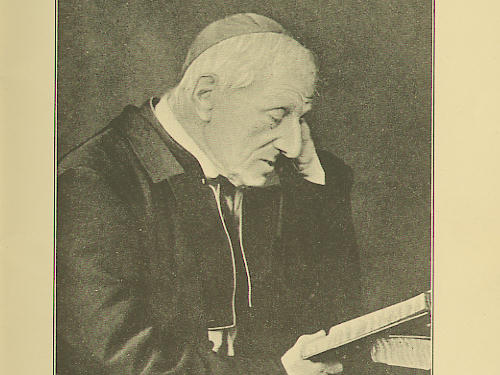Glory to God in the highest, and peace to his people on earth, in the new translation becomes, Glory to God in the highest, and on earth peace to people of good will.
This “new” wording represents a return to the Scriptural roots of the text (Luke 2:14) and the angels’ announcement of the Savior’s birth. The question some will ask is whether the Lord offers tidings of peace to all people or only just to those of good will?
God the Father, through his Son, Jesus Christ, does indeed invite all people to receive the gift of peace, but not the “don’t-worry-be-happy” variety that the world desires apart from divine law. The Council Fathers defined true peace in Gaudium et Spes, saying:
“Earthly peace results from the peace of Christ which radiates from God the Father… for by His Cross the incarnate Son, the Prince of Peace, reconciled all men with God… restoring all men to the unity of one people and one body” (GS 78).
The peace offered by the Savior, in other words, is directly related to “reconciliation” – that is, the forgiveness of sin. It is therefore no coincidence that we recall the angels’ announcement immediately after our prayers for forgiveness (during the Penitential Rite) and the priestly prayer of absolution (after the Kyrie) that followed.
 You see, to be among the people of good will we must first recognize, and have true contrition for, our sinfulness, because it is only in the forgiveness of sin that true peace – the peace of Christ – can exist.
You see, to be among the people of good will we must first recognize, and have true contrition for, our sinfulness, because it is only in the forgiveness of sin that true peace – the peace of Christ – can exist.
We formerly continued our prayer, Lord God, heavenly King, almighty God and Father, we worship you, we give you thanks, we praise you for your glory.
The new text, however, reads, We praise you, we bless you, we adore you, we glorify you, we give you thanks for your great glory, Lord God, heavenly King, O God, almighty Father.
This faithful translation adds the words adore, bless and glorify. Though worship is no longer said, the entire acclamation clearly is an act of worship; a rather substantial one at that. And why shouldn’t it be?
We just acknowledged our sins before God and one another. We just tasted the Lord’s mercy and forgiveness and the peace that comes with it – a gift freely given by God to poor sinners who but seek his healing love. If this doesn’t merit an abundant outpouring of praise and thanksgiving, nothing does!
We glorify you, we bless you….
How do we mere mortals glorify and bless God? Psalm 40 tells us:
“I will bless the Lord at all times, His praise shall be always in my mouth. In the Lord shall my soul be praised: let the meek hear and rejoice. O glorify the Lord with me; and let us extol His name together.”
To bless and to glorify God is to sing his praises, to magnify him among the peoples, and to tell all the lands of his greatness.
We adore you, we glorify you, we give you thanks… And why do we do so? For your great glory.
There is but one small change to the text here – the addition of the word great. Who can argue with its fittingness? Scripture itself describes the Lord’s glory as “great” numerous times. Sirach, for example, says, “The Lord hath wrought great glory through his magnificence from the beginning…” (Sir. 44:2)
So even though our outpouring of praise and thanksgiving is a fitting response to the great gifts that the Lord has just given to us in the Mass, it’s important for us to acknowledge that our God is more than just a collection of gifts; rather, His gifts reveal to us who God is from the beginning.
As Sirach tells us, a God of great glory is who God is from all eternity; that’s right, even before you and I came along to receive his gifts! And so when we say, We praise you, we bless you, we adore you, we glorify you, we give you thanks for your great glory, we do so because our God is an awesome God whose greatness exceeds our comprehension. He is so great that our lips cannot even begin to keep pace with the groanings of the Spirit who cries out on our behalf. He is worthy of every outpouring we can muster simply because of who he is; a God of great and eternal glory.
We then continue in the Gloria to say, Lord God, heavenly King, O God, almighty Father.
Our outpouring continues here in words very similar to the old translation, but notice how the exclamation O God seems to well-up almost spontaneously. It’s as though our hearts really are about to explode in thanksgiving and praise to the point where we can’t help but cry out almost without effort or forethought, O God! We are awestruck in the Lord’s presence, fittingly so, and the corrected translation seems to express this more passionately than before.
We have addressed the Father in the Gloria, now we turn our attention to the Son.
In the new translation we will pray, Lord Jesus Christ, Only Begotten Son, Lord God, Lamb of God, Son of the Father, you take away the sins of the world, have mercy on us…
Notice that we now speak of Jesus as both only begotten Son and Son of the Father. This may seem redundant, but it’s really meant to affirm a great mystery of the Blessed Trinity. For one, to be begotten of God indicates that Jesus is of the very same divine essence as the Father, and that he is co-eternal with him.
Furthermore, Jesus is indeed Son of the Father as we are used to saying, but then again I am the son of my father too. Unlike me, however, Jesus is not born of his Father; rather, he is begotten. This is important! You see, to be born is to have a beginning. In reality, however, neither does the Son nor the Fatherhood of God have a beginning.
And why is it so important for us to express this Trinitarian doctrine at this point?
In calling upon Jesus as both the only begotten Son and Son of the Father, we are expressing a keener awareness of why we just addressed God as almighty Father in the first portion of the Gloria. We addressed God as almighty Father in the outpouring of praise that preceded the words that we now address to the Son because God has always been Father – yes, even before he created us!
From here the only other change in the text is an additional plea for mercy. In the new translation the plea connects to the phrase You are seated at the right hand of the Father; the place from which our Lord will come again in glory to judge the living and the dead.
The Announcement of the Gospel
One of the “last minute” changes to be approved as of this writing concerns our response to the announcement of the Gospel reading, after the priest or deacon proclaims, A reading from the holy Gospel according to N.
The people will now reply, Glory to you, O Lord while making the threefold sign of the Cross on head, lips and heart. This is a minor change in the scope of things, certainly; in fact, many people have always said O Lord and not simply Lord as it appears in the current Missal.
The addition of the acclamation O, though small, is a linguistic device that effectively lends emphasis to our response and it is one that is employed rather frequently throughout Sacred Scripture. In the “Douay Rheims Bible” (a faithful English translation of the “Latin Vulgate”), for example, the expression O Lord appears nearly 500 times!
We will continue our examination with a look at the Creed in Part Eight.
* Excerpted from the book: And with Your Spirit – Recovering a sense of the sacred in the English translation of the Roman Missal – 3rd Edition. (© 2010 Salve Regina Publications – available at www.HarvestingTheFruit.com)



